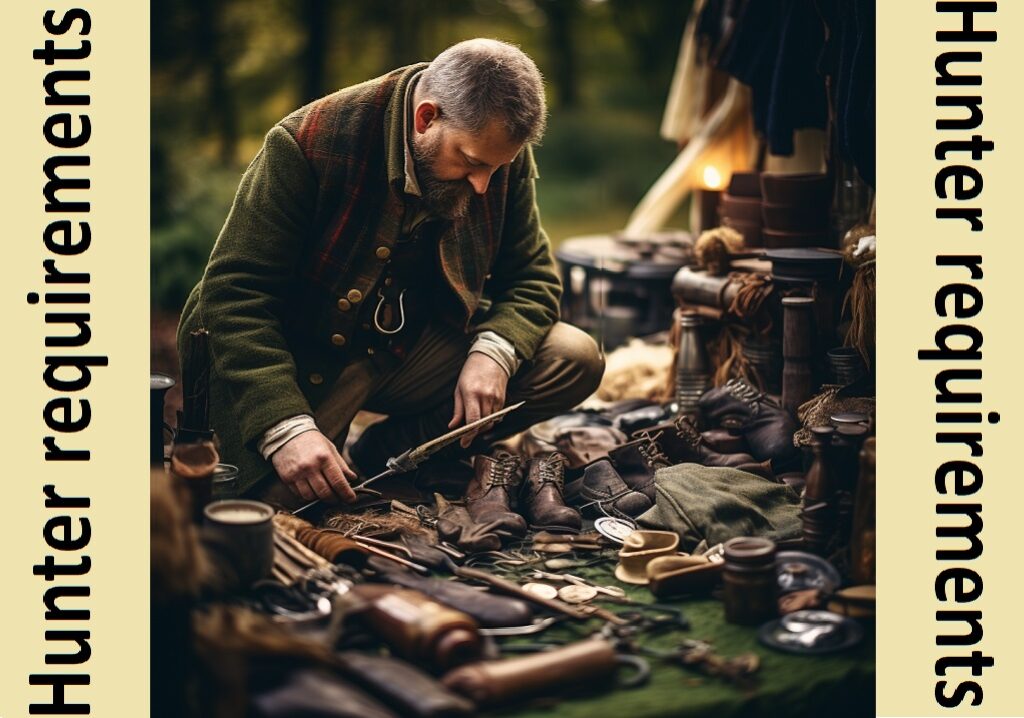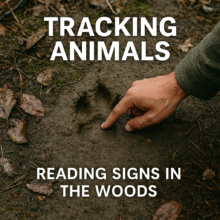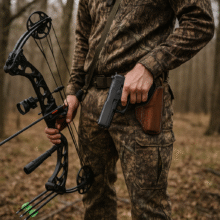Hunter Requirements: What You Need to Know Before Heading into the Field

Table of Contents
- Table of Contents
- 1. Introduction: Embracing the World of Hunting
- 2. Understanding Hunter Education and Licensing
- 3. Essential Skills and Knowledge for Hunters
- 4. Ethical Hunting Practices
- 5. Safety Measures in Hunting
- 6. Frequently Asked Questions (FAQs)
- 7. Conclusion: Step into the World of Hunting with Confidence
Table of Contents
1. Introduction: Embracing the World of Hunting
Hunting is a centuries-old tradition that allows individuals to connect with nature, experience the thrill of the chase, and provide sustenance for themselves and their families. However, before venturing into the field, it’s important to understand the requirements and responsibilities of being a hunter. In this comprehensive guide, we will explore the essential hunter requirements, covering topics such as hunter education, licensing, skills, ethical practices, and safety measures. By familiarizing yourself with these requirements, you can embark on your hunting journey with confidence and respect for both the wildlife and the environment.
2. Understanding Hunter Education and Licensing
The Importance of Hunter Education
Hunter education programs play a vital role in ensuring the safety and ethical practices of hunters. These programs provide comprehensive training on topics such as firearms safety, hunting regulations, wildlife conservation, and outdoor ethics. Participating in hunter education courses not only enhances your knowledge and skills but also instills a sense of responsibility and respect for the hunting tradition.
Obtaining Hunting Licenses and Permits
Before heading into the field, it is essential to obtain the necessary hunting licenses and permits as required by your state or local regulations. Hunting licenses are typically issued by wildlife agencies and are specific to the type of game you intend to hunt and the hunting season. In addition to licenses, some species may require specific tags or permits. Research your state’s hunting regulations to ensure compliance and to obtain the appropriate licenses and permits.
Understanding Local Regulations
Each state and locality has specific hunting regulations that must be followed. These regulations include hunting seasons, bag limits (the number of animals you are allowed to harvest), specific hunting zones or areas, and weapon restrictions. It is crucial to familiarize yourself with these regulations to ensure legal and responsible hunting practices. State wildlife agencies or local hunting organizations can provide you with the necessary information.
3. Essential Skills and Knowledge for Hunters
Firearms Safety and Handling
If you plan to hunt with firearms, it is essential to prioritize firearms safety and handling. This includes understanding the basic principles of firearm safety, such as always treating a firearm as if it is loaded, keeping your finger off the trigger until ready to shoot, and pointing the muzzle in a safe direction. Familiarize yourself with the operation and safety features of your firearm, and practice proper shooting techniques regularly. Taking a firearms safety course can provide valuable knowledge and ensure safe and responsible firearm use in the field.
Archery Skills and Equipment
For hunters using bows and arrows, developing archery skills is crucial. This involves practicing proper shooting form, accuracy, and effective shot placement. Mastering these skills takes time and consistent practice. Additionally, it’s important to select the appropriate archery equipment, such as bows, arrows, broadheads, and accessories, that are suitable for your hunting goals and comply with local regulations.
Being proficient in navigation and outdoor skills is essential for a successful hunting experience. Develop your ability to read maps and use a compass or GPS device to navigate unfamiliar terrain. Learn about natural landmarks, topographical features, and tracking skills to help you locate game and find your way back to your starting point. Outdoor skills such as shelter building, fire starting, and basic first aid can also come in handy during hunting expeditions.
4. Ethical Hunting Practices
Conservation and Wildlife Management
Ethical hunting practices involve a deep respect for wildlife and the environment. Understanding the principles of conservation and wildlife management is crucial. Hunters contribute to conservation efforts through the purchase of hunting licenses and permits, which fund conservation projects and wildlife management initiatives. It is important to support and participate in sustainable hunting practices that ensure the long-term health and balance of ecosystems.
Respecting Private and Public Lands
Respecting private and public lands is essential for responsible hunting. Obtain proper permissions from landowners before hunting on private property, and always adhere to their specific rules and regulations. When hunting on public lands, familiarize yourself with the rules and regulations set forth by the managing agency. Practice leave-no-trace principles, respect wildlife habitats, and do not damage or disturb the natural environment.
Proper Game Handling and Field Dressing
Proper game handling and field dressing are essential for both ethical and practical reasons. Learn the proper techniques for field dressing and handling game in the field. This includes quickly and efficiently field dressing the harvested animal to ensure the preservation of meat quality and to prevent spoilage. Additionally, properly dispose of any remains or carcasses in accordance with local regulations and ethical practices.
5. Safety Measures in Hunting
Personal Safety Equipment
Ensuring personal safety should be a top priority in hunting. Always wear appropriate safety equipment, including hunter orange or blaze clothing to increase visibility to other hunters. Use hearing protection when shooting firearms, especially in enclosed spaces or during prolonged exposure to loud noises. Consider wearing a hunter’s safety harness when hunting from elevated positions or using tree stands.
Hunting in Groups or Solo
Deciding whether to hunt in groups or solo depends on personal preference and the type of game being pursued. Hunting in groups can enhance safety by providing additional support and assistance. It also allows for shared experiences and camaraderie. However, if hunting alone, inform someone about your hunting plans, including your intended location and expected return time. Establish regular check-ins or carry a reliable means of communication, such as a cell phone or two-way radio, in case of emergencies.
Handling Hunting Accidents and Emergencies
In the unfortunate event of a hunting accident or emergency, knowing how to respond can be lifesaving. Carry a well-stocked first aid kit and be trained in basic first aid and CPR. Familiarize yourself with emergency contact numbers and the nearest medical facilities to your hunting location. Always prioritize personal safety and take appropriate actions to address emergencies promptly and effectively.
6. Frequently Asked Questions (FAQs)
1. Do I need a hunting license if I only plan to hunt on private property? Yes, in most cases, a hunting license is required regardless of whether you hunt on private or public land. Hunting licenses are typically issued by the state wildlife agency and are necessary to comply with local regulations.
2. Can I hunt without completing a hunter education course? Some states may allow individuals to hunt under the direct supervision of a licensed adult without completing a hunter education course. However, it is highly recommended to complete a hunter education course to ensure safety, ethical practices, and a better understanding of hunting regulations.
3. Are there age restrictions for obtaining a hunting license? Age restrictions for obtaining a hunting license vary by state. Many states offer apprentice or mentor programs that allow individuals of all ages to hunt under the supervision of a licensed adult before completing a hunter education course.
4. Can I hunt in multiple states with a single hunting license? No, hunting licenses are typically issued by individual states and are valid only within that specific state. If you plan to hunt in multiple states, you will need to obtain the appropriate licenses or permits for each state.
5. Can I hunt without owning firearms or archery equipment? Yes, you can participate in hunting without owning firearms or archery equipment. Many areas offer hunting opportunities through guided hunts or hunting leases, where equipment is provided. Additionally, some states offer programs that allow individuals to borrow firearms or archery equipment for hunting purposes.
7. Conclusion: Step into the World of Hunting with Confidence
Becoming a hunter comes with responsibilities and requirements that ensure safety, ethical practices, and respect for wildlife and the environment. By understanding the importance of hunter education, obtaining the necessary licenses, and developing essential skills and knowledge, you can embark on your hunting journey with confidence. Remember to prioritize safety, practice ethical hunting practices, and contribute to wildlife conservation efforts. Embrace the adventure, respect the traditions, and immerse yourself in the rewarding world of hunting. Happy hunting!







